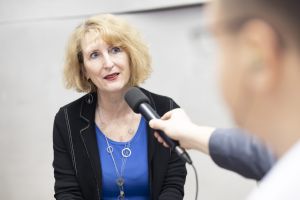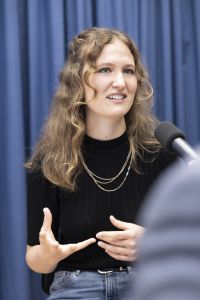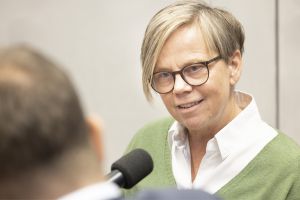Regarding the current debate around abusive behaviour at cultural institutions and arts universities, mdw Magazine spoke with Rector Ulrike Sych, Vice Rector Gerda Müller, and student representative Naomi Luther.
We’ve been seeing major cultural institutions and now also arts universities repeatedly confronted with accusations of sexual harassment and the abuse of power. Why is that?

Ulrike Sych (US): Sexual and gender-related harassment are present throughout society and hence also affect the realm of the arts and culture. In the arts, the emotional dimension is something that’s essential, and it’s important that artists be able to act freely in an emotional sense. But at the same time, the involvement of emotions makes people vulnerable and entails a special level of risk in terms of overstepping boundaries and abuse. We see this in the theatrical realm, in film, and also at arts universities. That’s the one thing. The other is that certain cultures of behaviour based in the past that we no longer tolerate or simply acquiesce to today do indeed still exist: in the arts, it was long the case that it was absolutely “normal” to be touched without first being asked for permission—and that one was subject to abusive behaviours while being ill-equipped to defend oneself because there was zero willingness to speak about it. It’s happily the case that in this regard, our field and society at large have been sensitised to this in a big way over the past few years. And as rector, I feel an important responsibility to combat any and all abuses of power—via prevention but also by reacting to instances of harassment as soon as I catch wind of them.
Gerda Müller (GM): Another thing that we can’t ignore where abuses of power are at issue is the general pressure to perform. Admissions to the mdw are strictly limited, the selection process is demanding, and it all requires a huge investment of time and effort.
Naomi Luther (NL): We have an extremely large amount of private and/or small group instruction, which means that you end up having a very close relationship with your professor. This naturally entails a certain power-relationship as well as a personal bond. What’s more, instrumental work tends to be very body-focussed—and in a certain sense, it just has to be that way. But both sides do need to communicate very clearly, of course, and things have to run according to the rules. Unfortunately, that’s not always the case—and boundaries get crossed.

US: One thing that’s really very important to us is that in cases where there are didactic and/or methodological reasons to touch a student, teachers are required to ask students whether they may and to explain the reason for it. This, by the way, is also stipulated in our university’s Code of Conduct. And if a student doesn’t consent to being touched, then that has to be respected: no means no.
GM: A professional approach to cultivating relationships is very important. We know that when people work together a lot, very close relationships arise where the boundary to the “familial” may often seem to be in play. That’s why it’s so essential that we convey to our teaching faculty a professional approach to how teaching is to be done and what standards we have at the mdw right from the beginning.
What can the mdw, as an institution, do in a structural sense in order to create conditions that hinder abuses of power and instances of sexual assault?
GM: We’ve already developed a diversity strategy by way of a participative process involving numerous colleagues and students. It has come to include a variety of different measures, like adding courses to our curricula that address diversity and issues of equality in order to ensure that these things are indeed accounted for in the context of students’ training. We also, as a further measure, deal with questions of equality in connection with the career-related support that we provide to women. And an extremely important instrument that we’ve developed together with the hmdw and will soon be releasing is a web tool designed to provide all of us an opportunity to learn about the various ways we can react in teaching situations that present difficulties—as students, but also as educators.
Following up on that: What kinds of assistance can the hmdw provide if one feels adversely impacted?
NL: One very low-threshold option that the hmdw offers is to speak with one’s student representative and, together with them, think about what steps to take: Should the department leadership be involved, do we want to go to the Working Group on Equal Opportunities, or do we actually have to initiate more serious consequences? In this last case, of course, one would also turn to the Rectorate. One can always take things up the ladder, but it’s extremely important to let students know that they don’t need to turn to the Rectorate straight off if a teaching situation gives them a bad feeling; very low-threshold offerings are also available.
US: I’ve been at the mdw since 1990, and right from the start, I was a member of the Working Group on Equal Opportunities—which I eventually came to lead. So I’m personally very well-versed in topics that have to do with countering discrimination and sexual harassment. And I’m familiar with the—absolutely justified!—anxieties and worries that students experience. For an artist, reporting such a violation represents a huge step. But at our University, unlike how things are later on in professional life, we take immediate action and have a clear mandate to protect victims. As Rector, I intervene unequivocally: if a student reports an instance of harassment that can be substantiated, it goes without saying that the student will be immediately separated from and also protected from the faculty member. The protection of victims is of enormous personal importance to me, and it’s also important to me for students to know that my door is always open to them. I think that people at the mdw are aware that I’m a rector who reacts rather than watches things play out. So if such a case is made known to me, I react right away—be it with a suspension or a firing, or by ordering a change of teachers or issuing a house ban. As rector, I also make use of numerous options. And furthermore, it’s very important to me that our students also have the option of turning to external bodies and interest groups.

GM: An important aspect that we need to deal with is fear: the fear of addressing an issue, the fear of reaching out, opening up, empowering oneself, speaking, and also calling attention to things when one’s not exactly sure what consequences it might entail. What will it mean for me as a person? What will it mean for my career? As our university’s leadership, we understand such fears 100 percent, we absolutely are bringing all of our energy and available options to bear in our efforts to alleviate these fears among young people, and it’s of great personal importance to me that we support young people so that they can stand up for themselves and empower themselves to look after themselves. In this light, it’s all the more important that there be multiple different options: options made available by the University leadership that entail immediate consequences but also options that are low-threshold and anonymous, so that one can choose what’s right for oneself from a broad range of possibilities.
A full-length audio version of this interview in which numerous related aspects are also addressed has been released as an episode of the mdw Podcast. Interviewer: Paul Lohberger

